In Memoriam: Remembering Michael Lewis
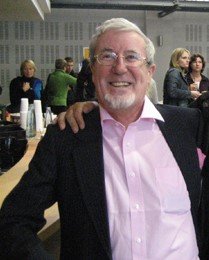
Editorial
The text is reprinted by permission form www.lexicallab.com
Also you can access and read a whole issue of HLTmag devoted to the work of Michael Lewis and his inspiration to language teachers here.
Hugh Dellar has over twenty-five years’ experience in the field and is the co-founder of www.lexicallab.com. He has co-authored two five-level General English series, Outcomes and Innovations, both published by National Geographic Learning, as well as one level of the high-school series Perspectives. His first methodology book, Teaching Lexically, came out via Delta Publishing in 2016. Most recently, he has worked on two levels of the new Pearson General English series, Roadmap.
Like many of you, my first encounter with Michael Lewis came via his seminal 1993 book The Lexical Approach: The state of ELT and a Way Forward. I did my DTEFLA in 1995 and it had already made it onto the reading list – possibly for the first time. It was utterly unlike any other ELT book I’d read in both its style and its polemical thrust. In retrospect, the fact that it was published by LTP, the company Michael had set up with Jimmie Hill, obviously meant he had a far greater degree of autonomy as a writer than he would have done had he chosen to go with a more established mainstream set-up.
The Lexical Approach was, in places, oblique, discursive and densely philosophical, but at its heart lay a way of looking at and thinking about language that really struck a chord with me. The idea that there was more to linguistic competence than simply learning lots of words and studying grammar forms and meanings really chimed with my own attempts to learn Indonesian, and on learning about such things as sentence stems and fixed / semi-fixed sentences, I started to see and hear examples everywhere. The fact that there were other ways of seeing language, ways that diverged from those I’d learned abiut during my training and from the way the vast majority of coursebooks laid language out, came as a welcome shock, and instilled in me a wonder and curiosity about the mundane and everyday that’s never ever left me.
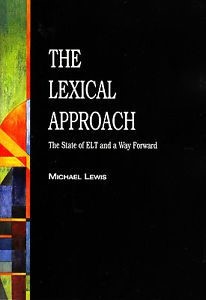
Of course, I later came to realise that much of what Michael had unpacked in The Lexical Approach wasn’t actually that original, but rather belonged to a long tradition going back years and including such groundbreaking works as Pawley and Syder’s 1983 article – Two puzzles for linguistic theory: nativelike selection and nativelike fluency – and Nattinger and DeCarrico’s Lexical Phrases and Language Teaching book. Where Michael’s genius lay was in synthesizing these ideas, branding them and selling them as a coherent whole. He was a great agitator, a disturber of norms, a challenger of assumptions. And, above all, he was a provocateur and a showman.
I can’t remember when I first saw him speak, but I think it may well have been at a talk he gave in London – perhaps in 1996. Entitled Stylistics and Literature, it was largely beyond my area of interest at the time, and what I recall most about it was the poor woman who asked at the end if he was going to say anything about pronunciation. “Madam”, he spluttered, “may I refer you to the title of my talk – stylistics and literature. What is it about that title that led you to believe I would be discussing pronunciation? I have said nothing about it for the same reason I have not mentioned Halliday’s work on systemic functional grammar, the intricacies of psycholinguistics or the construction of the Great bleedin’ Wall of China! (pause for dramatic effect). Does anyone else have any more sensible questions?”
That was fairly typical Michael: an inability to suffer fools gladly, a tendency to grandstand and hector, and a razor-sharp wit that dazzled even though you knew it could just as easily be turned on you if you weren’t careful.
The electricity in the room before he gave his talks at IATEFL was almost reminiscent of that ripple of expectation that goes round the crowd at a football match when an Henry or a Messi or a Ronaldo gets the ball. You didn’t know what exactly would occur, but you knew you were going to witness a spectacle.
I devoured all the LTP books I could get my hands on and learned something from all of them, though none had quite the same impact on me as that first formative read had. It was also around this time that I first started seriously writing material of my own. Along with a Kiwi friend I’d made on my DTEFLA, Darryl Hocking, I’d started recording huge swathes of my everyday conversations, transcribing them and noticing all manner of lexical (and lexico-grammatical) patterns in them that lay a long way outside the kind of thing coursebooks were providing me with. From this, we started writing lessons called things like talking about your weekend, talking about your plans and talking about people you know.
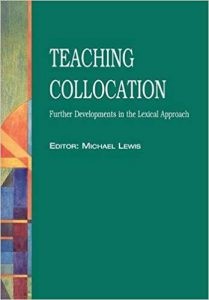
Emboldened by an article I’d read in ELTJ about how to pitch to publishers, we packaged these up, wrote a brief schpiel explaining the gap in the market as we saw it and the rationale behind our approach, and we sent them off on a wing and a prayer to seven or eight different people.
Again, with the wisdom of hindsight I can now see that we must have been among the first – if not the first – folk to contact major publishers claiming to be influenced by the lexical approach. To our amazement, this very quickly led to an interview in Oxford. Seated behind a very large desk were five rather scary power-dressed OUP folk keen to pick our brains about how we saw such an approach playing out across a coursebook and across a series. After almost two hours of this, they pushed our proposal to one side and asked if we’d like to take a look at a project they wanted writers for. “What’s wrong with that?” growled Darryl, gesturing in the direction of our discarded folder. “Our research doesn’t suggest there’s any market for that”, they replied. “Well, fuck that! I’m off”, he spat as he stormed out of the room, leaving me to apologise and make my excuses. I recall we drank several cans of lager on the train home and wondered if we’d done the right thing, or blown the only chance we were ever going to get.
A week or so later, the phone rang and a rather gruff Yorkshireman said “Hullo. Is this Hugh Dellar?” “Speaking” I replied. “Right. Good. This is Michael Lewis from LTP and I’m interested in your book proposal”. To say this seemed unlikely was an understatement. It was like the Rolling Stones calling and saying they wanted your band to support them. Things like this didn’t happen. I responded in the only way that seemed appropriate. “Fuck off, Darryl” I snarled. “I know it’s you.”
Five minutes later, the phone went again and the same voice – now sounding slightly bemused (and amused) managed “Um. There’s clearly been a bit of a misunderstanding. This really is Michael Lewis.”
And so it was that a few days later, we found ourselves first in the tiny cluttered LTP offices in Hove and then in a pub, where over pints of bitter and egg and chips Michael explained that he liked our work – it had potential, and he’d like to try and turn it into a coursebook. “It’ll need a lot of work and it’s nowhere near ready yet”, he added, “but we’d be keen to help bash it into shape.” This was all we needed to hear. We knew we’d earn less and have a far smaller reach then we would with OUP, but we also knew we’d get to work on our baby and get guidance from someone we both massively respected and looked up to. It was, to use a fixed expression, a complete no-brainer.
Thus began our journey towards becoming published authors. Much of our day-to-day interaction was with Jimmie Hill, who was more hands on with the materiel and more intuitively editorial. Yet through it all, Michael was an ever-present figure in the background, often chipping in with little pearls of wisdom that I still often refer to as First Principles. “Never take a cash fee if you can get a royalty” was advice that’s stood me in very good stead throughout my career, as is “start by thinking how the language works. Then work backwards and think of exercises that allow you to make that clear’”.
Michael was also responsible for my first overseas trip as a writer, taking me to Poland IATEFL in – I think – 1999, shortly after my thirtieth birthday. I will never forget the way my anxiety at going out for dinner with him, Michael Swan and Mike McCarthy was eased by the kindness and interest that all three were generous enough to show me.
The very first Innovations – a strange Intermediate / Upper-Intermediate hybrid – came out in 2000 and caused exactly the kind of stir Michael had been hoping it would. Never massively adopted, but widely admired, discussed and even copied, it was a book ahead of its time (even if I do say so myself) and to this day, I still have teachers telling me it changed the way they saw language.
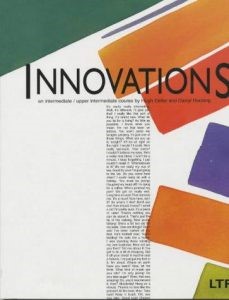

Yet just as it was published, LTP were essentially folding. Jimmie and Michael had put the company up for sale for a whole host of reasons, not the least of which was the fact that the Internet age was clearly coming and Michael had no interest in engaging with it. It’s a minor tragedy for our profession that so little of his work exists online. No videos of talks, no interviews, nothing. He exited stage left just as the era we now live in flickered and buzzed into being.
To compound the confusing mixture of emotions I was feeling around this time, Darryl had decided to return to his native New Zealand. Luckily for me, I’d already met Andrew at University of Westminster, where we were both teaching and had started testing the waters with him. The upshot of all this was we both ended up going to what was then Thomson Heinle as part of the furniture in a deal that allowed both Michael and Jimmie to effectively retire. In their 50s. The bastards.
Jimmie stayed on in a consultancy role and worked on the early stages of the innovations series, as it became, and we’d sometimes meet Michael for long boozy lunches. He’d often seem ever so slightly adrift, spending a lot of time and money going to the opera and following the England cricket team around the world. There were a string of doomed relationships with younger partners and possibly more solitary drinking then was strictly healthy.
He’d occasionally make noises about one last book he felt he had in him. I remember him talking a lot about his excitement on discovering how central chunking was to spoken Chinese and his this was related to his latest idea …. but in the end, it all came to naught. As we started to establish ourselves and stand on our own two feet, we saw him less. A pint now and again when down in Brighton, the odd email.
His last hurrah came at a conference we organized in 2013 to mark the twentieth anniversary of The Lexical Approach. He gave a talk, engaged most entertainingly in a Q&A and then held court in our local boozer after the thing had wound up.
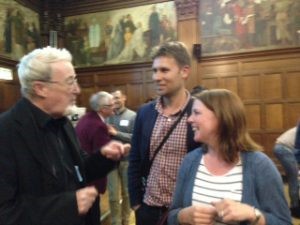
I saw him twice after that, once when I took him out for lunch after catching him wandering round Brighton IATEFL looking slightly lost, a bit disheveled and clearly slightly the worse for wear. He’d sauntered around unrecognised for half an hour, now a stranger in a world that not fifteen years previously he’d been a king of.
We managed a final pint last year when the conference returned to Brighton. He looked frail and had had a fall, but traces of the wit and his sense of mischief remained.
He died early in March 2019, having spent the last two years in a home. At his request, there was no funeral.
I owe him more than I suspect he ever realised. I could, of course, have kept in touch more than I did and done more to preserve and record his ideas, but he wasn’t a man who made such things easy and in the end, we all have our own lives to be getting on with, our own stars to follow. All of our dyings occur in the midst of the lives of others.
Reprinted by permission from
https://www.lexicallab.com/2019/03/in-memoriam-remembering-michael-lewis/
In Memoriam: Remembering Michael Lewis
Hugh Dellar, UKOn Humanising and Language and Teaching
Edwin Salter, UKWhy I Don’t Write To Publish
Rozaliya Ziryanova, UzbekistanIs English Only Comprehensible Input?
Brooks Slaybaugh, JapanAn Origin Story
Jamie Keddie, Spain